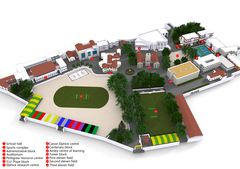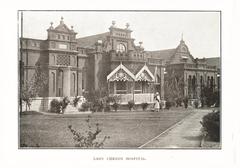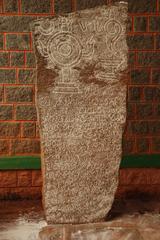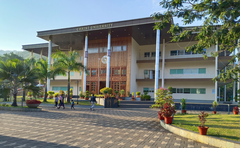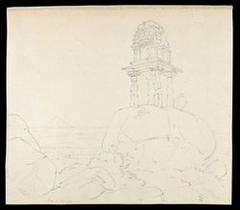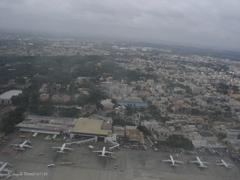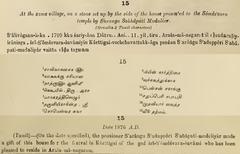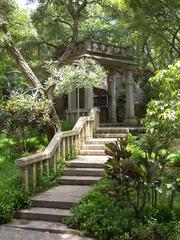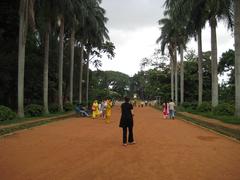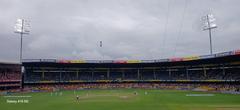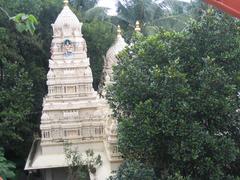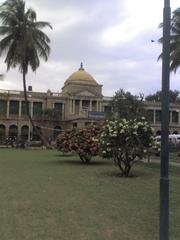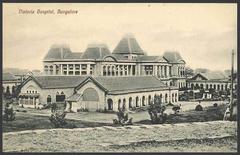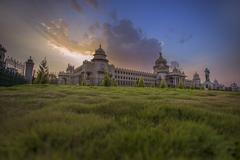Daly Memorial Hall Bengaluru: Visiting Hours, Tickets, and Visitor Guide
Date: 04/07/2025
Introduction
Daly Memorial Hall stands as a distinguished emblem of Bengaluru’s colonial heritage and intellectual spirit. Centrally located near Cubbon Park and Bangalore Palace, this iconic structure was established in the early 20th century as the headquarters of the Mythic Society—an institution dedicated to the study and preservation of South Indian history, archaeology, and culture. Named after Sir Hugh Daly, a prominent British administrator instrumental in Mysore’s governance, the hall is celebrated for its blend of Greco-Roman and Indo-Saracenic architectural styles, featuring stately Corinthian columns, reclaimed French terracotta floors, and Mangalore tile roofing. Over time, Daly Memorial Hall has evolved from its colonial origins into a vibrant venue for lectures, exhibitions, and scholarly gatherings, while housing the Mythic Society Library—home to an extensive collection of rare manuscripts, maps, and academic texts.
This guide provides a comprehensive overview of Daly Memorial Hall, covering its history, architectural highlights, preservation efforts, practical visitor information (including hours, ticketing, and accessibility), and tips for exploring nearby attractions. Whether you are a history enthusiast, architecture lover, or traveler seeking to discover Bengaluru’s heritage, this article will enrich your visit. For updates and official information, refer to the Mythic Society website and Karnataka Tourism.
Table of Contents
- Introduction
- Origins and Construction
- Historical Significance
- Role in Bengaluru’s Cultural Landscape
- Architectural Features and Preservation
- Visiting Information (Hours, Tickets, Accessibility, Tips)
- Key Events and Notable Figures
- Transformation and Contemporary Relevance
- Visitor Insights and Historical Context
- Daly Memorial Hall in Numbers
- Frequently Asked Questions (FAQs)
- Architectural Style and Influences
- Integration of Local and Colonial Elements
- Symbolism and Cultural Significance
- Comparison with Other Colonial-Era Buildings
- Preservation and Modern Use
- Visiting the Mythic Society Library
- Historical Background and Significance
- Collections and Rare Materials
- Visitor Information: Hours, Tickets, Accessibility
- Visitor Experience and Tips
- Cultural and Educational Impact
- Further Exploration and Summary
- References
Origins and Construction of Daly Memorial Hall
Daly Memorial Hall was conceived as a hub for public gatherings, lectures, and cultural events during the British Raj. The foundation stone was laid in 1876, and construction completed in 1881. Named for Sir Henry Daly, the British Resident of Mysore and Coorg, the building was designed to reflect the colonial administration’s focus on civic engagement and intellectual pursuits (Karnataka Tourism).
The hall’s architecture is a blend of neoclassical and Indo-Saracenic elements, with a façade featuring grand columns, arched windows, and ornate cornices. The interiors are distinguished by high ceilings, wooden paneling, and intricate plasterwork, signaling the cosmopolitan ambitions of early Bengaluru’s urban society.
Historical Significance in Colonial Bengaluru
Daly Memorial Hall rapidly became a focal point for the city’s intellectual and social life. It hosted the Bangalore Literary and Scientific Society, which promoted education and scientific inquiry, and served as a meeting place for civic organizations and reformist groups. Notably, Daly Memorial Hall provided one of the few spaces in colonial Bengaluru where Indians and Europeans could interact on relatively equal terms, encouraging a spirit of cross-cultural exchange that helped shape the city’s cosmopolitan identity (Deccan Herald).
Role in the Development of Bengaluru’s Cultural Landscape
As Bengaluru transitioned from a cantonment town to a bustling urban center, Daly Memorial Hall remained at the forefront of its cultural scene. Its central location and spacious auditorium made it ideal for theatrical productions, classical music concerts, and art exhibitions. The hall nurtured local talent and introduced audiences to both traditional and Western artistic forms. The association with the Bangalore Literary and Scientific Society cemented its status as a hub of intellectual and artistic activity, a legacy that continues to influence Bengaluru’s cultural reputation.
Architectural Features and Preservation Efforts
Daly Memorial Hall is distinguished by its neoclassical façade with imposing columns, a large auditorium seating over 500, wooden balconies, and decorative plasterwork. Despite its historical significance, the building has faced preservation challenges. Restoration efforts by local heritage organizations and the Karnataka government have focused on structural repairs, conservation of original materials, and modernization to meet contemporary standards (The Hindu).
Visiting Daly Memorial Hall: Hours, Tickets, Accessibility & Travel Tips
- Visiting Hours: Typically open from 10:00 AM to 6:00 PM, Tuesday through Sunday. Closed on Mondays and public holidays.
- Tickets: Entry is generally free for most events. Fees may apply for special exhibitions or performances—check the official website for details.
- Guided Tours: Offered occasionally; advance booking is recommended.
- Accessibility: Wheelchair-accessible with ramps and accessible restrooms.
- Getting There: Centrally located near Cubbon Park; accessible via BMTC buses, Bangalore Metro (Cubbon Park Station), taxi, and auto-rickshaw.
- Nearby Attractions: Cubbon Park, Bangalore Palace, and Government Museum are within easy reach.
Key Events and Notable Figures
Daly Memorial Hall has hosted historic events, including public addresses by Indian independence leaders and British dignitaries, as well as cultural festivals showcasing the region’s artistic traditions. Prominent personalities include Sir Henry Daly (namesake) and Sir Mark Cubbon, both pivotal in Bengaluru’s development.
Transformation and Contemporary Relevance
Post-independence, Daly Memorial Hall has adapted to serve a diverse population, acting as a venue for cultural events, exhibitions, and community engagement. Recent initiatives have strengthened its role in Bengaluru’s arts scene, ensuring the hall remains a living symbol of the city’s heritage (Bangalore Mirror).
Visitor Insights: Historical Context for Today’s Tourists
Daly Memorial Hall offers a unique opportunity to experience Bengaluru’s colonial past. Guided tours and exhibitions delve into the city’s history, the contributions of Sir Henry Daly, and the evolution of civic institutions. Its central location allows visitors to easily explore other historical sites (Karnataka Tourism).
Daly Memorial Hall in Numbers
- Foundation Stone Laid: 1876
- Completion: 1881
- Seating Capacity: ~500
- Architectural Style: Neoclassical with Indo-Saracenic influences
- Main Functions: Lectures, cultural events, exhibitions, academic programs
Frequently Asked Questions (FAQs)
Q: What are Daly Memorial Hall’s visiting hours?
A: Open 10:00 AM to 6:00 PM, Tuesday through Sunday; closed on Mondays and public holidays.
Q: Is there an entry fee?
A: Entry is generally free; special events may have ticket fees.
Q: Are guided tours available?
A: Yes, but advance booking is recommended.
Q: Is Daly Memorial Hall accessible for people with disabilities?
A: Yes, with basic accessibility features.
Q: What nearby attractions can I visit?
A: Cubbon Park, Bangalore Palace, and the Government Museum.
Architectural Style and Influences
Daly Memorial Hall exemplifies early 20th-century colonial architecture in Bengaluru, merging Greco-Roman and Indo-Saracenic styles. Its portico features fluted Corinthian columns, a rare sight in the city, and the use of reclaimed French terracotta tiles and Mangalore tiles reflects both European influence and local adaptation (Wikipedia). The design was intended to convey authority, permanence, and a commitment to civic and scholarly pursuits (Trek Zone).
Key Architectural Features
- Facade and Columns: The striking portico with Corinthian columns defines the entrance and sets Daly Memorial Hall apart among colonial-era buildings (Wikipedia).
- Materials and Construction: Funded by the Maharaja of Mysore and other patrons, the hall’s floor features reclaimed French terracotta tiles and a Mangalore-tiled roof, combining durability and aesthetic appeal (Wikipedia).
- Interior Spaces: Designed for lectures and scholarly gatherings, the spacious interiors offer natural ventilation and light, with high ceilings and terracotta tiling (LBB).
- Heritage Conservation: Having survived over a century, the hall remains a living monument, thanks to continuous use and preservation efforts (Wikipedia).
Integration of Local and Colonial Elements
While the primary architectural references are European, Daly Memorial Hall incorporates local materials and techniques, notably the Mangalore tile roof and terracotta flooring. This blend of imported and indigenous elements is characteristic of many colonial buildings in Bengaluru (The South First).
Symbolism and Cultural Significance
The Greco-Roman style was chosen to evoke ideals of rationality, democracy, and civic virtue—values central to the Mythic Society’s mission. The building’s collaborative construction, involving both British officials and Indian rulers, symbolizes a period of cooperation and shared intellectual endeavor (Wikipedia).
Comparison with Other Colonial-Era Buildings in Bengaluru
Daly Memorial Hall stands out for its Greco-Roman portico and unique material choices, differing from the neoclassical and Gothic styles of other landmarks like Mayo Hall and Attara Kacheri (Roof and Floor). Unlike government buildings, Daly Memorial Hall was designed for community and scholarly engagement.
Preservation and Modern Use
Today, Daly Memorial Hall continues as the Mythic Society’s headquarters, housing a library with over 46,000 rare books and manuscripts. Ongoing conservation and digitization efforts ensure the building remains vital to Bengaluru’s intellectual and cultural life (LBB, Mythic Society).
Visiting Daly Memorial Hall: Essential Information
- Location: Nrupathunga Road, Sampangi Rama Nagar, Bengaluru (Trek Zone)
- Library Hours: 10:00 AM–5:15 PM (weekdays and Saturdays), 10:00 AM–4:00 PM (Sundays), closed Mondays (LBB)
- Tickets: Free entry; borrowing privileges for members only.
- Accessibility: Basic accessibility features; contact the Society for specific needs.
- Guided Tours: Not regularly offered; staff may provide information.
- Photography: Permitted in public areas; best during daylight.
How to Reach Daly Memorial Hall
- Public Transport: BMTC buses to Cubbon Park/Sampangi Rama Nagar.
- Metro: Cubbon Park Metro Station (Purple Line).
- Taxi/Rideshare: Direct drop-off at the entrance.
Nearby Attractions and Heritage Walks
Daly Memorial Hall is ideally located for a heritage walk, with Cubbon Park, the Government Museum, Attara Kacheri, and Mayo Hall all nearby. Exploring these sites on foot offers a multifaceted experience of Bengaluru’s colonial and cultural heritage.
Visiting the Mythic Society Library: Hours, History, and Tips
Historical Background
The Mythic Society, founded in 1909, has made Daly Memorial Hall its headquarters since 1917. The library behind the hall, over a century old, supports research in history, archaeology, philosophy, and more, and is a renowned repository of rare materials (LBB Bangalore).
Collections
- Rare Books/Manuscripts: Includes Sanskrit manuscripts, early editions of the Mahabharata, works of Plato and Cicero, and over 4,000 titles on Karnataka’s history.
- Maps/Archival Material: Valuable old maps, revenue reports, and archival documents.
- Digitization: The library maintains traditional card catalogues and has begun digitizing rare and fragile materials.
Visitor Information
- Library Hours: 10:00 AM–5:00 PM (Tuesday–Sunday), closed Mondays.
- Entry: Free; some services/events may require prior arrangement.
- Location: Central Bengaluru, near KR Circle (Nrupathunga Road).
- Accessibility: Wheelchair-accessible; ramps and seating available.
- Events/Tours: Lectures and special events occasionally hosted; check the Mythic Society website.
- Photography: Restricted; permission required.
Practical Tips
- Check opening hours and special notices in advance.
- Bring ID for accessing rare materials.
- Plan for at least a few hours to explore.
- Respect library rules and preservation guidelines.
Cultural and Educational Impact
For over a century, the Mythic Society Library has been central to Bengaluru’s intellectual life, hosting lectures, discussions, and facilitating research that deepens understanding of South Indian heritage (LBB Bangalore).
Further Exploration
Pair your visit to Daly Memorial Hall with other Bengaluru cultural sites such as the National Gallery of Modern Art, Karnataka Chitrakala Parishath, and the Museum of Art & Photography (CN Traveller). Heritage walks and local events are often organized by community groups.
Summary and Final Tips
Daly Memorial Hall epitomizes the convergence of Bengaluru’s colonial history, architectural elegance, and pursuit of intellectual advancement. Its distinctive Greco-Roman and Indo-Saracenic design, coupled with its continued cultural and academic use, makes it a vital part of the city’s living heritage. With free entry, accommodating hours, and proximity to other landmarks, Daly Memorial Hall is a must-visit destination for those seeking to explore Bengaluru’s past and present. For up-to-date information, consult official channels and heritage resources, and consider using the Audiala app for event updates and heritage walks.
References
- Daly Memorial Hall Visiting Hours, Tickets & Exploring Bengaluru’s Historical Sites (Karnataka Tourism)
- Daly Memorial Hall: A Forgotten Landmark (Deccan Herald)
- Daly Memorial Hall to Get a Facelift (The Hindu)
- Daly Memorial Hall Bengaluru (Wikipedia)
- Mythic Society Library in Bengaluru (LBB Bangalore)
- Visiting the Mythic Society Library (LBB Bangalore)
- Daly Memorial Hall (Bharatpedia)
- Daly Memorial Hall to Get a Facelift (Bangalore Mirror)
- The Many Lives of Bengaluru’s Colonial-Era Buildings (The South First)
- Popular Historical Sites in Bengaluru (Roof and Floor)
- Places to Visit in Bengaluru Not Tourist Traps (CN Traveller)

